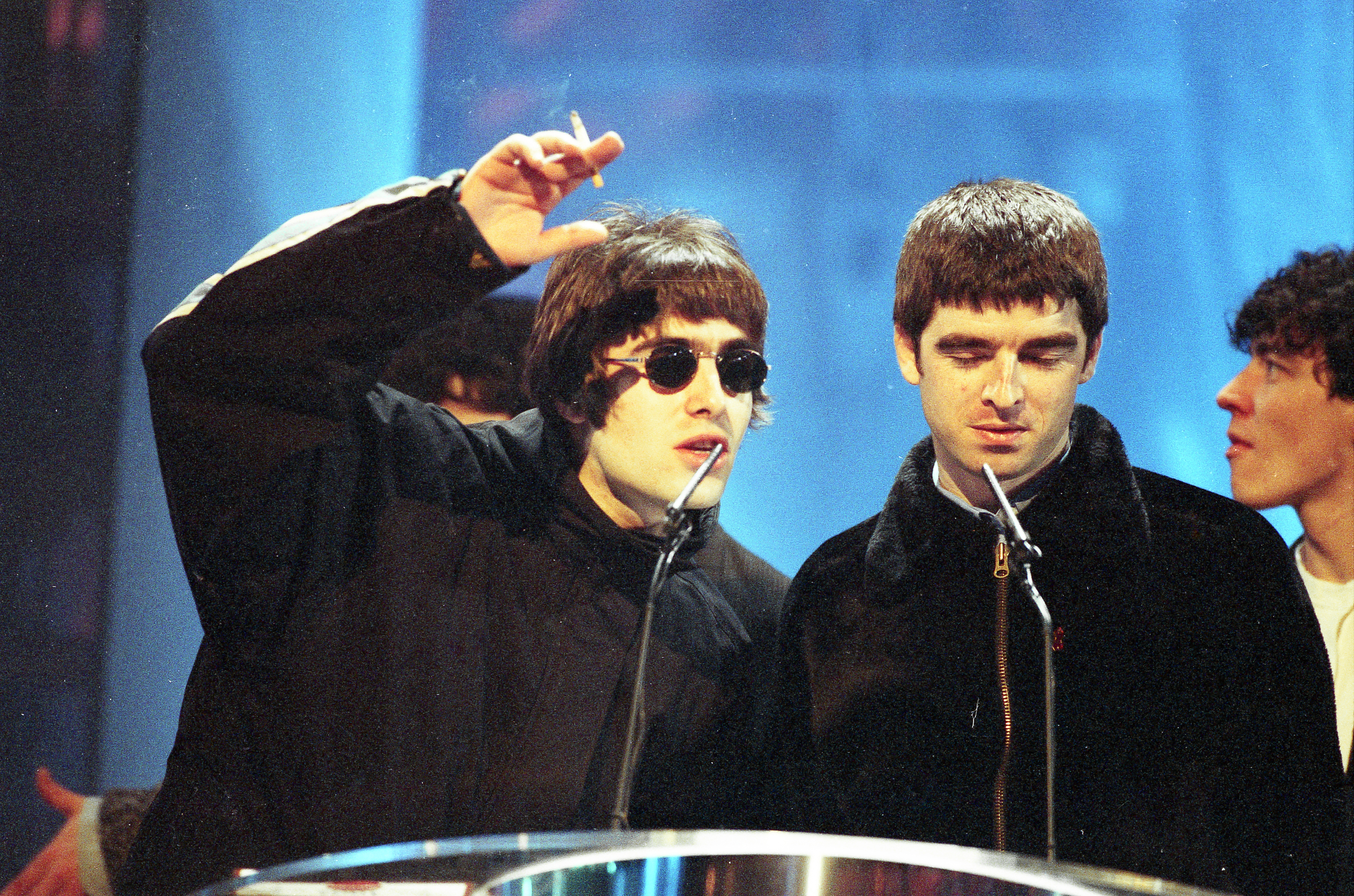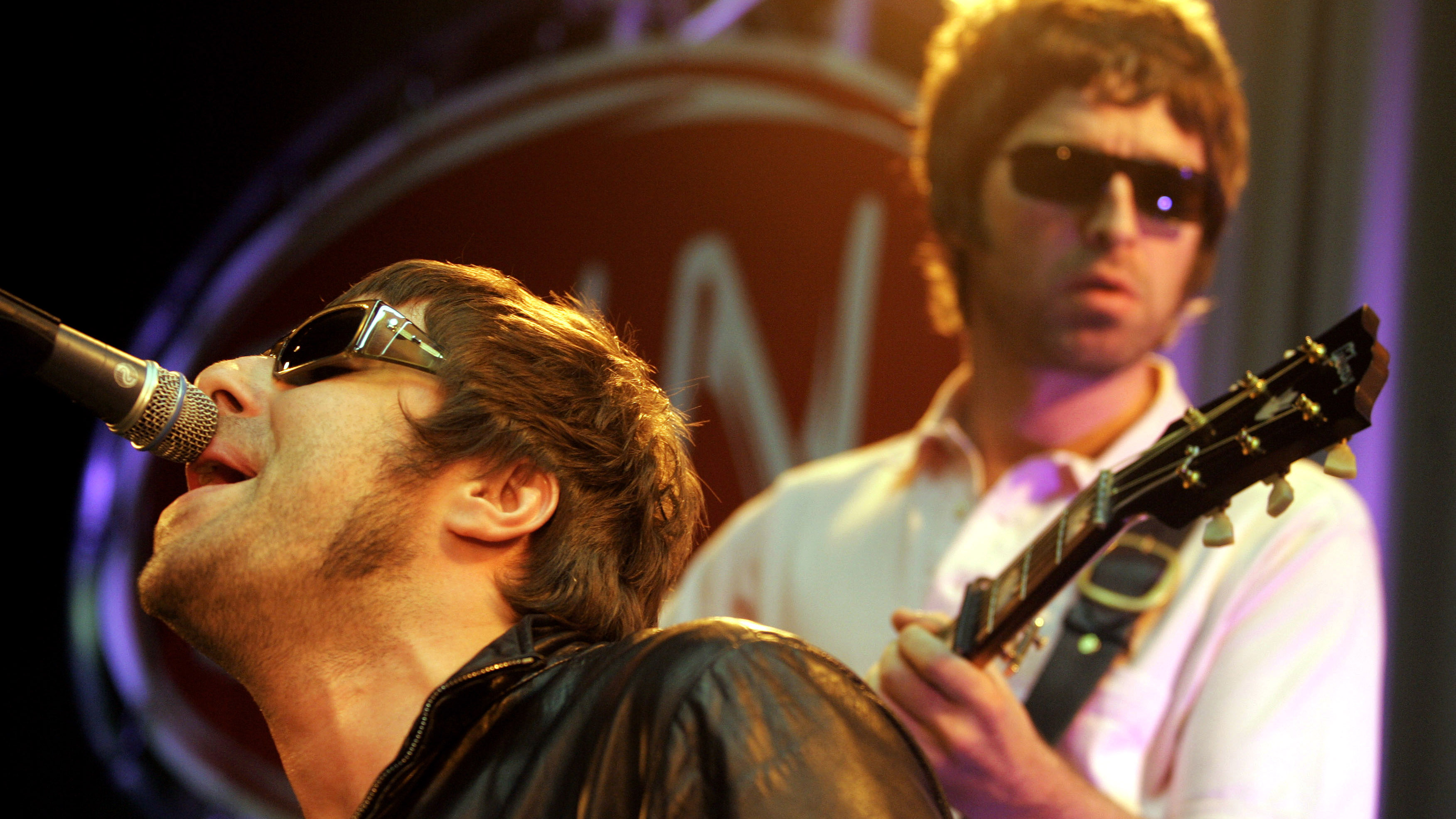
In honor of the Oasis reunion tour, Welcome To Hell World recently asked fans of the band to list their best songs. John Cullen picked Wonderwall, and to pre-empt critics that believe it’s a boring choice, he argues: “This is one of the greatest songs in history. Just because some of your university friends defaulted to it at karaoke doesn’t act as a strike against it, I’m sorry.”
Even though Liam Gallagher sings “like he just fell down the stairs into a dank pub in Manchester”, Cullen argues that he nevertheless “absolutely nails a vulnerable longing that many have tried to capture and very, very few have done so well.”
Wonderwall was a smash hit in 1995, reaching number two on the UK charts and number eight in the US. But in 2024, are young people still pulling out their guitars at parties and playing it? I asked my students, and they assured me that this is very much a thing. These kids weren’t even born when the song came out! The brothers Gallagher have apparently touched a deep intergenerational nerve.
How did this song become such a standard for beginner guitarists? Why did it attain meme status? Before we address these challenging questions, let’s start with a simpler one.
What exactly is a Wonderwall?
No one seems to know. From an article in The American Songwriter, I learned that Wonderwall is the name of a British film from 1968. The titular wall separates two apartments, one inhabited by a scientist, the other by a model. The scientist discovers a hole in the wall and becomes a peeping tom (which, gross.) George Harrison wrote songs for the film, and the soundtrack was the first solo album by a member of the Beatles. Noel Gallagher saw a copy of the soundtrack someplace, and the rest was history.
The song was originally titled Wishing Stone, but Noel thought “wonderwall” sounded better
The song was originally titled Wishing Stone, but Noel thought “wonderwall” sounded better. But what does he mean by it? In a 1996 Rolling Stone article, Liam explains that a wonderwall “can be anything… It’s just a beautiful word. It’s like looking for that bus ticket, and you’re trying to fucking find it, that bastard, and you finally find it and you pull it out, ‘Fucking mega, that is me wonderwall.’” That does not enlighten me much, but maybe I’m overthinking it.
Noel told NME that he wrote the song to cheer up his then girlfriend, later wife, and finally ex-wife Meg Mathews. After they split, Noel denied it had ever been about her in the first place, saying instead that it’s directed to an imaginary person. I didn’t know any of this backstory going into this article, and I can’t say that learning it has changed my experience of listening. Whatever power the song has, it isn’t in the literal meaning of the lyrics, such as it is.
The instrumentation
Owen Morris produced Wonderwall along with the rest of (What’s The Story) Morning Glory?. He and the band worked fast; it only took them half a day to put the song down, and the entire album was done in a few weeks. Liam sings and plays tambourine. Noel plays guitar, piano and bass; the band’s bassist Paul "Guigsy" McGuigan doesn’t appear on the track. Paul “Bonehead” Arthurs plays the cello patch on a Mellotron, a kind of primitive analogue sampling keyboard from the 1960s. The paradigmatic Mellotron sound is the flute at the beginning of the Beatles’ Strawberry Fields Forever.
Drummer Alan White used Promark hot rods, bundles of thin wooden rods that are quieter and more diffuse-sounding than than standard drumsticks. He had only recently replaced the band’s original drummer, Tony McCarroll. In a Q Magazine interview., Owen Morris praised White for being “intelligent and articulate and a real musician”, but then said that he wasn’t a fan of White’s playing: “Alan’s essentially a jazz drummer. He is NOT a rock band drummer. He was always shuffling away on his snare (which actually became the signature rhythm of Wonderwall), and never hitting the basic back beats in a dumb rock and roll way.” Morris has a point. You can see White using a traditional grip in the video, a sure sign of a formally trained drummer.
Hot rods and Mellotron are mildly interesting twists, but otherwise, the song is a standard mainstream rock production. It could just as easily have been recorded in 1975 as 1995; its only era-specific touch was the brickwall limiting. Oasis’ deliberate non-innovativeness is a big part of their appeal; we will get into that below.
The theory
Wonderwall has a reputation for being a big, dumb, four-chord song. It is definitely easy to learn and play, but it has more going on harmonically and melodically than I expected. Noel plays the song in E minor, but he has a capo on the second fret of his guitar, so it sounds in F# minor. In the following section, I’ll be discussing the chords he plays, not the ones you hear. Transpose everything up a whole step to get the key of the recording.
The chords are highly guitaristic; no pianist would ever have written them. Every chord in the song pedals the notes G and D on top, the notes you get on the third fret of the B and E strings. The song’s intro is a loop of Em7, G, Dsus4, and A7sus4, two chords per bar. The first three chords belong to the key of E minor, but A7 is an outlier, because it belongs instead to the jazzier E Dorian mode.
The distinctive note that sets it apart is C-sharp, but because he’s playing A7sus4 rather than A7, Noel’s guitar part doesn’t actually include that note. Nevertheless, it’s strongly implied. Anyway, the verse continues the intro loop until the last line (“about you now”), where it switches to C(add9), Dsus4, and a full bar of A7sus4.
The vocal melody is as guitaristic as the chord progression. It’s based around the easiest possible scale to play on guitar, the open-string E minor pentatonic. The first note of the melody is B, a typical enough choice over an Em7 chord. However, Liam sings it strikingly flat, making it an ear-grabbing blue note.
The drums enter in the second half of the verse, but they don’t come in on a downbeat like you expect. Instead, they start in the middle of the line “backbeat, the word is on the street”. This choice is a baffling one. Why not have the drums hit on the word “backbeat”? I suspect that Alan White may have come in late by accident, and then the band decided that they liked the effect.
The prechorus begins with an Aeolian cadence: C(add9), Dsus4, Em7. That repeats, and then after another C(add9) and Dsus4, there’s a quick descending major scale bassline under a G chord: G, G/F#, G/E. This leads into two full bars of A7sus4 on the line “don’t know hoooow”. Each phrase in the prechorus’ vocal melody starts on F-sharp, the first departure from E minor pentatonic so far.
The chorus is a loop of C(add9), Em7, G, and Em7. The vocal melody includes a new note, C, on the “af-” in “after all” and on the “-der-” in “wonderwall.” That note is native to the key of E minor, but none of the Cs in the melody occur over the C chords. The melody has been more or less independent of the chords the whole time, but in the chorus, it’s particularly striking. You feel the song as a general vibe rather than a harmonic structure with an order and sequence to it.
The final Em7 chord in the chorus hangs for an extra bar and a half. This is a disruption to the hypermeter that I’m sure trips up every dorm-room busker. Everything settles back into structural regularity with the second verse, and there are no further surprises or oddities for the rest of the song.
Brotherly love
You can’t talk about an Oasis song without getting into Liam and Noel’s public persona. They are an easy target for parody, as David Cross and Bob Odenkirk demonstrated on Mr Show in 1997.
Americans like me are not very sensitive to British class politics and regional identity; everybody just sounds “British” to us. But in their native country, Liam and Noel’s roots in working-class Manchester are the most salient part of their identity. Manchester’s closest American equivalent is Detroit, an unglamorous industrial city with a surprisingly rich musical history. Aside from Oasis, Manchester has also been home to the Smiths, Joy Division, Simply Red, the Stone Roses, the Verve, the 1975, and even the Bee Gees (though they technically grew up in the suburb of Chorlton.)
Jason Diamond cites the Gallaghers as examples of a British archetype that he calls “The Lad”, a defiantly uncouth working-class character with hip-hop-like swagger, best embodied by Begbie from Trainspotting. Diamond explains that the Kinks and the Who are Lads, but the Rolling Stones aren’t, and that John Lennon was a Lad even if he wanted not to be. The Lad doesn’t have to be male; Diamond lists Adele as an example too.

The Gallaghers aren’t just Lads; they are brothers, and their relationship is, shall we say, fraught. As the lead singer, Liam might be the voice of Oasis, but Noel is the band’s undisputed leader. He is not humble about this. In the aforementioned Rolling Stone article, he says, “I’m in the best band, and I’ve just written the best album. So as far as I’m concerned, everybody can fuck right off. Those other bands are not even in a position to string my guitar at the moment. Fucking wankers, all of ’em.”
Liam has a similar level of self-confidence, and the brothers do not resolve their conflicts with quiet compromise. They may be more famous for fighting than for music. A tape of them verbally abusing each other was even released as a single, and it made it up to number 52 on the British charts.
It’s not necessary to know any of this to enjoy learning and playing Wonderwall on guitar, but it does give you some insight into the song’s outsized cultural footprint.
The meme
Wonderwall is easy and fun to play, but so are a lot of songs. Why has this one saturated the amateur guitar world so completely? Why do people call that specific voicing of Em7 “the Oasis chord”? Some guitar stores have banned Wonderwall, putting it in the rarified company of Stairway to Heaven, Smoke on the Water and Seven Nation Army.
The specific meme phrase, “anyway, here’s Wonderwall” originates in this video:
It works as a caption for anyone with a guitar - or any other instrument, for that matter. The more incongruous the instrument is, the better, and the same goes for incongruous players.
Amusing though the meme is, Christopher Hill argues in The Voice Mag that it has a deeper meaning: “The Wonderwall meme isn’t about the song; it’s about the player… there is an implied discouragement of new guitarists from trying to learn the piece: it becomes a ‘cringe’ activity.” The song may be a cliche, but it got that way for a reason, it’s a useful learning tool. To some, a would-be guitar bro inflicting Wonderwall on his roommates might be cringe, but we need to careful not to discourage amateur musicianship.
The word “amateur” simply means “lover of”, and don’t we want more music lovers? Amateur musicians will always vastly outnumber professionals, so why not encourage them? Everyone is a beginner at some point. It’s hard enough to push through the early stages of music learning without being anxious about being mocked for it.
Wonderwall isn’t a simple pastiche of classic rock songs - it’s a little peculiar
Wonderwall is a reassuring song. It’s reassuringly easy to play, and even when it was new, it was reassuringly familiar. Aaron Bady points out that in the 1990s, “guitar bands had stopped being cutting edge--all the cutting edge music was non-white people--so ‘an un-novel pastiche of past guitar bands’ was a way for Britpop to live in its white past”.
But Wonderwall isn’t a simple pastiche of classic rock songs, either. It’s a little peculiar. Liam Gallagher’s voice is abrasive, the chords and melody don’t have traditional harmonic function, and the drums enter in the wrong place. I have noticed that really huge hits tend to be conventional in their broad strokes but weird and a little annoying in their details. If Wonderwall was too easily digestible, we would long ago have moved on. The same is probably true for the Gallagher brothers.









